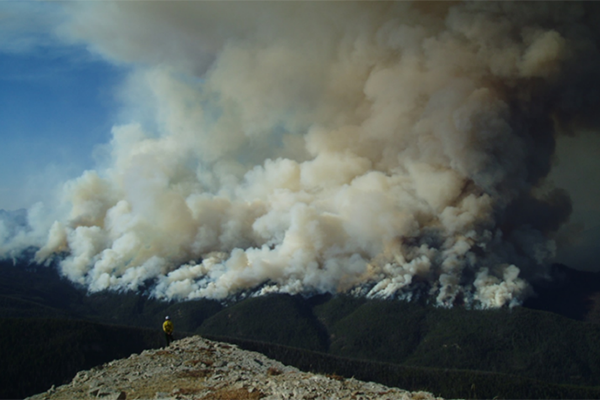Workshop Synthesis Paper Describes Value of Prescribed Fire in Wilderness Areas

Press Release from Western Colorado University
“We have both the opportunity and responsibility to recognize fire’s ability to renew the landscape”
GUNNISON, Colorado, September 18, 2023 - Many of the wilderness areas that we treasure were historically shaped by fire. Yet today, many wilderness landscapes are caught in the wildfire paradox – widespread suppression and exclusion of burning over the last century have increased the likelihood of high-intensity fires, which are more damaging rather than restorative. In December of 2022, experts from land management agencies, Tribes, and organizations across the country convened at the Wilderness and Fire Workshop in Gunnison to consider solutions to this dilemma, including the use of prescribed fire.
On Monday, September 18, The Center for Public Lands at Western Colorado University, in partnership with the Aldo Leopold Wilderness Research Institute, released a synthesis paper titled “Prescribed Fire and U.S. Wilderness Areas: Barriers and Opportunities for Wilderness Fire Management in a Time of Change.” The paper presents the discussions of fire and wilderness experts from the Wilderness and Fire Workshop, including the opportunities they identified to help overcome barriers to using prescribed fire in wilderness.
Dr. Jonathan Coop, Western Colorado University Professor of Environment and Sustainability, has spent two decades studying the effects of fire on the landscape and is a principal investigator for this project. He says, “Many wilderness ecosystems were historically shaped by fires ignited by lightning and Indigenous peoples. Deliberately restoring fire in order to avoid the negative outcomes of fuel buildup and climate change can increase the natural qualities of these places while honoring human relationships with the land that predated their designation as wilderness.”
This synthesis paper incorporates the thinking of wilderness and fire managers, Tribal members, and others with decades of combined experience and research in the field of wilderness management and prescribed and managed fire. Evidence shows that the relationship between the land and fire has departed from historical norms because of human actions and a changed climate. The result is increasingly extreme wildfires that threaten a range of wilderness values, forest ecosystems, and society at large. According to workshop participants, prescribed burns present an opportunity to return balance to the forest ecosystem under more predictable and favorable conditions than those currently accompanying lightning strikes.
Sean Parks, research ecologist and co-author from the Aldo Leopold Wilderness Research Institute, says, “Prescribed fire may be necessary to restore wilderness ecosystems that are increasingly degraded by over a century of fire exclusion and the unprecedented effects of today’s wildfires.”
There is strong agreement among experienced land managers that, in a landscape where the gap between current and ideal wilderness conditions is growing, fire should be able to move naturally across the landscape when people or property are not at risk. The synthesis paper also acknowledges challenges. Although prescribed burns aren’t prohibited by the Wilderness Act, they are rarely used as a management tool because of disagreement over the impacts fires have on wilderness values.
Western Colorado University encourages policymakers, land managers, and conservation organizations to consider the paper’s findings when making decisions about forest management practices in wilderness areas. To schedule an interview with Dr. Coop, please contact Western’s Media and Communications Manager, Seth Mensing, at smensing@western.edu. To see the full synthesis paper, please visit www.centerforpubliclands.org/cpl/wildrx.
About Western Colorado University: Established in 1901, Western is a four-year public institution in Gunnison, Colo. that offers undergraduate and graduate programs in over 100 areas of study. Our campus on the Western Slope of the Rocky Mountains is home to more than 2,000 resident students, while approximately 1,600 additional students take courses at the University remotely.
About Aldo Leopold Wilderness Research Institute (ALWRI): Operating continuously since 1967, ALWRI was established as an interagency facility in 1993 to serve as a “model for integrated research and management to advance the understanding of the social, cultural, and ecological significance of wilderness and wildlands.” ALWRI is responsible to an Interagency Wilderness Policy Council and Interagency Wilderness Steering Committee and hosted by the USDA Forest Service Rocky Mountain Research Station.
Seth Mensing
Media and Communications Manager
Western Colorado University
970-943-7027